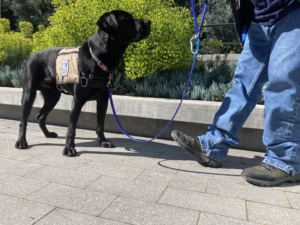Veteran Service Organizations Team Up to Serve Warriors in the Bay Area
 Both nonprofits that support Veterans in the Bay Area, Warrior Canine Connection (WCC) and Swords to Plowshares (Swords) teamed up in 2020 to provide WCC’s Mission Based Trauma Recovery (MBTR) service dog training as part of Swords’ programming for the Veterans it serves but the pandemic had other plans — it was put on pause before it had gotten a chance to get off the ground.
Both nonprofits that support Veterans in the Bay Area, Warrior Canine Connection (WCC) and Swords to Plowshares (Swords) teamed up in 2020 to provide WCC’s Mission Based Trauma Recovery (MBTR) service dog training as part of Swords’ programming for the Veterans it serves but the pandemic had other plans — it was put on pause before it had gotten a chance to get off the ground.
In 2021, as COVID-19 restrictions eased, the partnership and its programming started back up, first working in small groups outdoors at two of Swords’ locations — the Veterans Academy in Presidio and the Edwin M. Lee Apartments in Mission Bay, where the organization supports previously homeless, low-income and at-risk Veterans.
Shelley Smith is a WCC service dog training instructor who leads the MBTR training for the program. So, how does it work? Veterans involved learn to train service dogs for their fellow Veterans, facilitating a time-honored military tradition of Warriors helping Warriors. In doing so, the Veterans involved can also benefit from skills development in communication, confidence building, accountability, emotional regulation, and patience to promote an act of service while receiving a therapeutic benefit.
“It’s a win-win for both the dogs and the Veterans — the dogs are getting great practical experience with a diverse population of Veterans, many of whom may experience mobility challenges similar to those the Service Dog will later support, and the Veterans are learning new skills and also benefiting from the patience, understanding and other positives that come from working with the dogs,” said Smith.
And judging by this comment shared by a participant who asked to remain anonymous, the program is having a positive impact.
“I am always very stressed before a session, and after spending time working with the dogs, I feel 100% better and ready to accomplish my day.”
Allison Champagne, a peer support specialist for Swords to Plowshares, says out of all its program offerings, the service dog training program has become its most popular.
“I have merely been a spectator or facilitator. In my time watching these training sessions, I have seen a fairly dramatic shift in the attitude and behavior of veterans who otherwise have been known to be shy, reserved, anxious, and reclusive,” said Champagne. “After fostering a strong connection in the training process and the care of the dog, this group of Veterans has become committed, consistent, great at establishing relationships, patient, open to asking questions, vulnerable in a group setting, and confident being a leader and teacher.”
Champagne added, aside from the benefits participants gain from the program, what may be even more profound is that it also allows for the Veterans to give back to other Veterans.


